
All categories
Featured selections
Trade Assurance
Buyer Central
Help Center
Get the app
Become a supplier

(7325 products available)



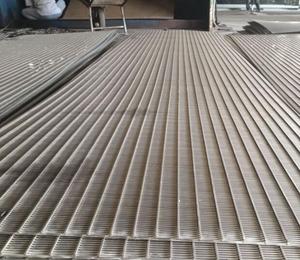





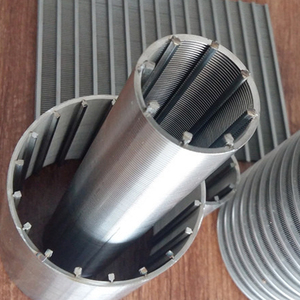






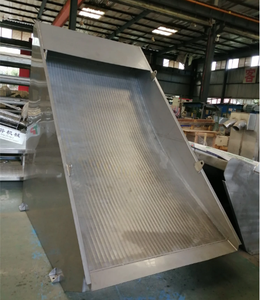
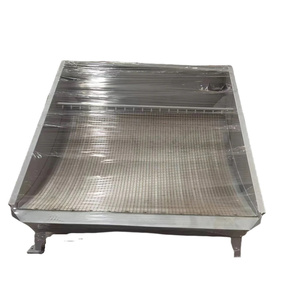


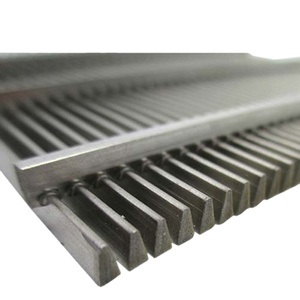
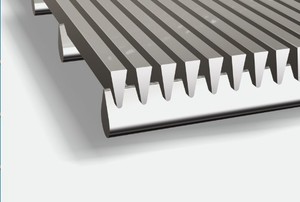





A wedge wire screen is a V-shaped wire or rod profile used to create a filtering medium with an open gap that does not block water flow. In general, the wedge wire screens can be divided into three main types based on different shapes and features, including the standard wedge wire screen, which features triangular wires with a wider gap, the round wedge wire screen, and the oval wedge wire screen.
Standard Wedge Wire Screen:
Standard Wedge Wire Screens are triangular rods or wires set apart with the thinner end pointing downward. The triangular shape creates larger openings that increase to a small point and help filter solids. They are often found in static applications like separating liquids from solids in the water treatment or food industry. Businesses prefer Standard Wedge Wire Screens because they provide effective filtration without using much energy.
Round Wedge Wire Screen:
Round wedge wire screens are made in circular shapes. They serve the same purposes as the standard wedge wire screens by filtering liquids from solids. However, round wedge screens are more common in the oil and gas industry. They are often used for well screens to separate reservoir sand from crude oil or natural gas. Compared to other types, round wedge wire screens can withstand greater pressure and last longer in tough conditions. This durability makes them a top choice in oil and gas applications where reliability is crucial.
Oval Wedge Wire Screens:
Oval wedge wire screens have an oval-shaped profile with a large open area. Although they are not as common as standard oval wedge wire screens, they can be used for various filtration and separation purposes, such as well screens, sieve plungers, sand filters, and strainer baskets. They are suitable options for commercial buyers looking for screens that fit different needs and achieve effective filtration solutions.
Materials
Cottonseed Delinting Wire Grading Screens are predominantly made of stainless steel because of its inherent features that are essential for optimal performance. Stainless steel offers unrivaled strength and durability, ensuring the screens can withstand heavy-duty use without significant wear and tear. Its robust construction quality is a crucial factor in maintaining operational efficiency and minimizing downtime due to equipment failure. As a result, choosing stainless steel for the material of wedge wire screens directly contributes to their longevity and dependable service in various industrial applications.
Construction
Cottonseed Delinting Wire Grading Screens are designed with a distinct wedge shape. This unique feature provides benefits beyond typical screens. The structure promotes self-cleaning during operations by allowing particles to slip between the gaps, preventing clogs. Moreover, the angled openings enhance liquid flow rates while maintaining particle separation efficiency.
Another significant aspect of these screens' construction is the support grid. The grid provides additional stability and strength to the screen, preventing it from warping or sagging over time. With this grid's help, the screen can maintain its shape and function effectively for a longer period, even under demanding working conditions.
Sizes
Wedge wire screens are available in various sizes to cater to multiple machine requirements. Their versatility makes them suitable for use in diverse industries and applications. Dimensions such as length, width, and the size of the openings can all be customized according to specific needs. This ability to modify parameters allows for the successful adaptation of wedge wire screens to distinct operational requirements and conditions.
Inspection
Regular inspections should be part of the maintenance schedule. This process involves checking for any signs of damage or wear, like holes, tears, or blockages. A prompt repair or replacement can be ensured if any issues are found during the inspection.
Cleaning
It is necessary to clean the screens periodically to maintain their efficiency and prolong their lifespan. The cleaning process should be performed based on the specific type of wedge wire screen and the materials being processed. Guidelines provided by equipment manufacturers should be followed carefully. This method ensures the chosen cleaning approach is effective and prevents any unnecessary damage to the screens or equipment.
Protection
The screens should be appropriately protected when not in use. This process involves storing them in a dry and clean location away from direct sunlight or extreme temperature conditions that could cause distortion or damage over time. Furthermore, it's essential to keep screens protected from potential contaminants such as dust, dirt, or moisture that may degrade their quality and performance. Adhering to these storage practices can significantly enhance the durability and reliability of the screens.
The application range of Wedge wire screens is very wide. They can be found in many industries such as the oil and gas industry, food and beverage industry, mining industry, pulp and paper industry, water treatment industry, chemical industry, power generation industry, agriculture, fisheries, construction industry, and architectural industry, etc.
When selecting the wedge wire screens for sale, buyers should keep in mind some essential considerations that can help them choose the correct applications and maximize performance.
Understand the needs:
It is important for buyers to understand the specific application's requirements, such as the type of material, temperature and pressure conditions, flow rate, particle size, and aperture needed in the operation. Knowing these parameters can greatly help choose the most suitable wedge wire screen.
Consider the materials and builds:
It is important to choose high-quality stainless steel materials (such as 304, 316, 316L, etc.) with exceptional corrosion resistance and durability. Buyers should also pay attention to the screen's precise gap and sturdy construction, which can provide uniform sorting results and prevent clogging.
Opt for the right shape:
Since different shapes of screens are compatible with specific equipment and separation needs, buyers need to choose the suitable ones depending on their particular mixing devices and separation requirements. If in doubt, buyers can always ask sourcing agents to help them find suitable screens.
Test performance:
Whenever possible, buyers should test the performance of the wedge wire screen before making a bulk purchase. Check factors such as filtration accuracy, flow rate, and separation efficiency, etc. This will enable buyers to better evaluate different screens' performance.
Think about maintenance:
Maintenance is crucial for the long-term performance of the wedge wire screen. Choose screens that allow easy cleaning and maintenance, which can ensure their consistent operating performance over a long period, thus saving future maintenance costs.
Find reliable suppliers:
Buyers need to find reputable suppliers with reliable quality and good after-sale services. Going through past customer reviews on the suppliers’ product pages should give buyers a good insight into the level of service provided by the supplier. If in doubt, buyers can always ask for references to help them make a good choice.
Q: What is a wedge wire screen used for?
A: Wedge wire screens are used in various industries for separation, filtering, and draining purposes. They are commonly employed in water treatment plants, food processing, petrochemical refineries, mineral processing, and pulp and paper manufacturing.
Q: How durable is the wedge wire?
A: Wedge wire is known for its durability. Stainless steel wedge wire can withstand high temperatures and pressures, making it suitable for demanding applications. The inherent open-area strength of wedge wire is also excellent, allowing it to withstand heavy loads and deformation.
Q: Can Wedge wire screens be recycled?
A: Wedge wire screens are recyclable. The material composition of the screens allows them to be processed and reused in the manufacturing of new products.
Q: What are the benefits of using a wedge wire screen?
A: Wedge wire screens offer several advantages, including high flow rates, efficient separation, low clogging tendencies, and durability. The screens provide businesses with reliable solutions for filtration and separation needs.
Q: Can clients customize the wedge wire product?
A: Customization options might be available for clients who want to choose size, shape, or design of their wedge wire screens. It is essential to discuss specific requirements with the supplier to explore any available tailoring possibilities.